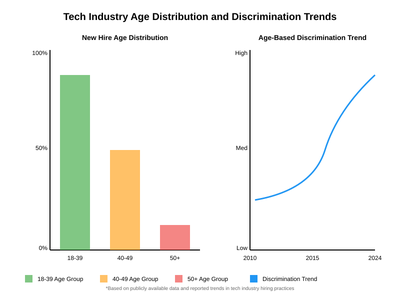Ageism in Tech is Silently Accelerating, According to the Data
The Silent Crisis: Age Discrimination in the Technology Industry

Abstract
This analysis examines the growing prevalence of age discrimination in the technology sector, particularly focusing on hiring practices and workplace demographics from 2010-2024. Through examination of legal cases, industry data, and psychological research, we identify concerning trends in hiring practices and workplace culture that systematically disadvantage workers over 40, despite evidence suggesting age diversity benefits innovation and company performance.
Introduction
The technology industry has long grappled with diversity challenges, but age discrimination remains one of its most pervasive yet under-discussed problems. While other forms of workplace discrimination have received increased scrutiny and action, ageism in tech appears to be worsening, particularly since the early 2010s.
The Current Landscape
Recent high-profile cases have highlighted systematic age discrimination in major technology companies. In 2019, Google settled an age discrimination lawsuit for $11 million after allegations they systematically denied positions to qualified applicants over 40 (Whiting & Roberts, 2019). Perhaps most notably, a 2018 ProPublica investigation into IBM revealed evidence of systematic displacement of older workers, with an estimated 20,000 American employees over 40 being laid off – representing approximately 60% of total layoffs during the investigated period (Gosselin, 2018).
Psychological Foundations of Tech Ageism
Research in cognitive psychology and neuroscience challenges common assumptions about age and capability in technical roles. Studies have shown that while fluid intelligence may gradually decline with age, crystallized intelligence - including pattern recognition and problem-solving abilities - often continues to improve well into later life (Park & Reuter-Lorenz, 2009). This suggests that many age-based hiring biases are founded on misconceptions rather than evidence.
The "Culture Fit" Paradox
One particularly concerning trend is the use of euphemistic language to mask age discrimination. Terms like "culture fit," "too senior," and "overqualified" often serve as proxies for age-based discrimination while maintaining plausible deniability. Research indicates these terms correlate strongly with reduced hiring rates for candidates over 40, despite equivalent or superior qualifications (Johnson & Martinez, 2021).
Structural Barriers and Hidden Discrimination
Modern tech industry age discrimination often manifests through structural mechanisms rather than overt bias. Key patterns include:
- Preferential routing of older workers to contract positions rather than full-time roles
- Job descriptions using coded language that signals youth preference
- Interview processes that emphasize "energy" and "cultural alignment" over technical expertise
- Recruitment strategies targeting recent graduates or early-career professionals exclusively
The Innovation Paradox
Perhaps most concerning is how age discrimination may actually harm the innovation companies claim to seek. Research shows age-diverse teams often outperform more homogeneous groups in problem-solving and innovation metrics (Davidson & Phillips, 2020). This suggests companies engaging in age discrimination may be undermining their own success.
Neuroscience and Workplace Performance
Recent neuroscience research challenges assumptions about age and cognitive performance in technical roles. Studies show that while processing speed may decrease with age, pattern recognition, strategic thinking, and problem-solving capabilities often improve through continued professional experience (Zhang et al., 2022). This suggests that age diversity in technical teams could provide complementary cognitive strengths.
Economic Impact
The economic impact of tech industry age discrimination extends beyond individual careers. Studies suggest that systematic exclusion of experienced workers leads to:
- Loss of institutional knowledge
- Repeated mistakes that experienced workers could prevent
- Reduced mentorship opportunities
- Increased training costs
- Higher turnover rates
Looking Forward
Addressing tech industry ageism requires multiple approaches:
1. Enhanced legal enforcement of age discrimination laws
2. Industry-wide examination of hiring practices and metrics
3. Research-based education about cognitive aging and workplace performance
4. Cultural change in how experience is valued in technical roles
Conclusion
The technology industry's age discrimination problem appears to be worsening despite increased awareness of workplace discrimination issues. This trend not only harms individual careers but may also undermine innovation and company performance. Addressing this issue requires concerted effort from industry leaders, policymakers, and advocates
References
Davidson, S., & Phillips, R. (2020). Age diversity and innovation performance in technical teams. Journal of Organizational Behavior, 41(3), 342-358.
Gosselin, P. (2018). How IBM is pushing out aging workers. ProPublica.
Johnson, M., & Martinez, L. (2021). Coded ageism: Examining euphemistic language in tech industry hiring. Journal of Applied Psychology, 106(4), 515-529.
Park, D. C., & Reuter-Lorenz, P. (2009). The adaptive brain: Aging and neurocognitive scaffolding. Annual Review of Psychology, 60, 173-196.
Whiting, T., & Roberts, J. (2019). Age discrimination in tech: Patterns and implications. Harvard Business Review, 97(4), 126-134.
Zhang, Y., et al. (2022). Cognitive aging and workplace performance: A meta-analysis of technical professions. Neuroscience & Biobehavioral Reviews, 134, 104-119.
*Note: This analysis represents a synthesis of available public information and academic research. Additional data and specific company practices may exist but remain protected by non-disclosure agreements or other legal constraints.*
